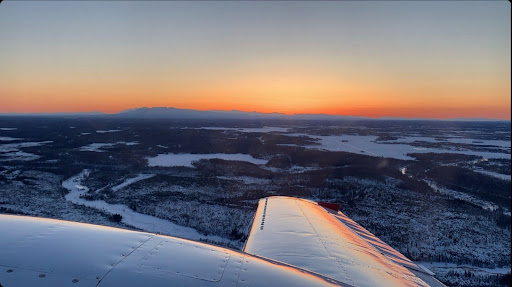Everyone should learn how to fly a plane

Sunset over Point Mackenzie, Alaska from the cockpit of a Piper PA-30
May 11, 2022
Everyone should learn how to fly a plane. The outside knowledge it provides will live with you throughout your lifetime.
Nothing gives more self-satisfaction than landing a plane by yourself for the first time.
The Basics Behind Flying
You can fly a plane by yourself, or solo, as early as age 16. Once you solo, you can fly anywhere you please with your instructor’s sign off. Once you get 40 hours and reach the age of 17, you can obtain a private pilot’s license.
From there you have a full range of flying and can bring your friends to experience flying with you. When you initially think of flying a plane you may think it is overwhelming and terrifying to do, but maybe that should be your reasoning to learn how to fly. No instructor will allow you to solo unless they are 100% sure you are capable of flying the plane, which should be reassuring.
As someone who has solo’d, I realize the terror that comes while preparing for your first solo, but it is worth it.
Once your wheels are up and you have entered the pattern, it is smooth sailing. You will experience self control like you have never before.
You will feel a tranquility fall over your body when your wheels squeak on your first solo landing; and from there you will fall in love with living above the clouds.
Outside Knowledge Flying Provides You
Flying can also be informational. You will learn communication skills through speaking to Air Traffic Control (ATC), how to stay calm during emergencies and you’ll be able to learn about the scenery and nature around you in a completely different way.
Communication skills may not be the first thing you think of when you think of being a good pilot, but it is important. Speaking slow and precise is vital for successful communication between the pilots and ATC. They will read information to you and you must be paying attention and reiterate the information back to ATC.
The communication skills you obtain from flying are especially important because they teach you how to speak to people in a way to get your message across.
Freaking out during an emergency is the worst thing to do.
While learning how to fly your instructor will do simulated emergencies. You will most likely practice an engine out and a stall. They do this so you know how to recover in case an event like this happens in real life.
It teaches you to stay calm, communicate and figure out your best way of survival. You don’t have time to have a freak out moment when you are losing 5,000 feet per minute, you learn how to stay calm and collected.
When your instructor pulls power back to simulate an engine out without your knowledge, you quickly learn to go through your muscle memory to sustain altitude and prevent a crash landing.
It sounds intimidating but once you do it for the first time, you realize a different type of trust within yourself.
If you love beautiful scenery, flying may be up your ally.
Being able to see mountains, rivers and the oceans from the air is truly a different experience.
Flying enables you to love your surroundings in a different aspect that you can not experience elsewhere.
Besides the life experiences flying gives you, it is also a slight flex to say you can fly a plane.
Times are changing, women in flying was never popular until recently. Flight organizations all over the world are urging women to learn how to fly.
As the male dominant career is slowly turning neutral, everyone should go out and learn how to fly. It may even settle your nerves while flying on commercial planes.

